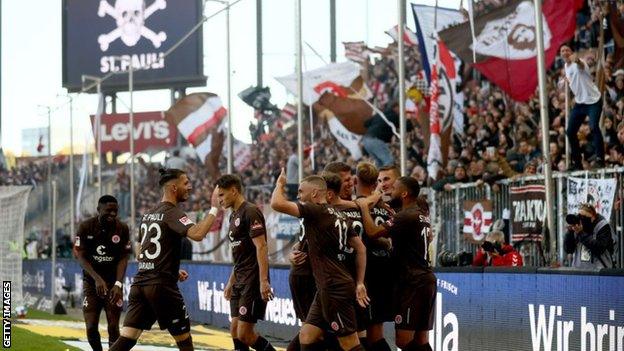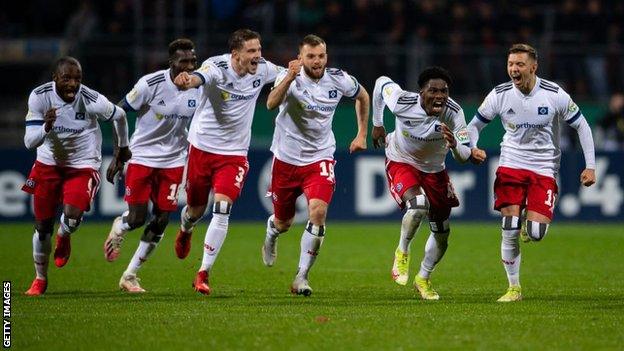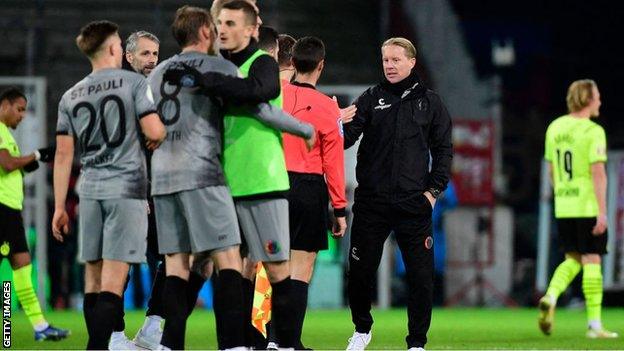HSV v St Pauli: The Hamburg derby and race for promotion
- Published

League leaders St Pauli are looking to return to the Bundesliga for the first time since 2011
For a long time Hamburger SV could claim football bragging rights in a city where rivals St Pauli are more renowned for their distinctive culture than on-the-field exploits.
But it is the neighbourhood club who are undefeated in their past five meetings going into Friday's derby, a game with a little more riding on it.
Both sides head into the game as part of an excruciatingly tight promotion battle in which every club in the top half of the 2. Bundesliga table can legitimately claim to have aspirations of reaching the top flight.
Just seven points separate leaders St Pauli from Nurnberg in ninth after 19 games, with HSV fifth and lodged between clubs in Werder Bremen and Schalke who not so long ago were more focused on trying to achieve Champions League football.
The top two will go up automatically, with third place facing a play-off against the club finishing third bottom in the Bundesliga.
Covid restrictions mean just 2,000 fans will be present at HSV's 57,000-capacity Volksparkstadion and only 100 of those will be from St Pauli, but that has not stopped excitement in the city building.
"It is always something special," says Tanja Hufschmidt from the HSV Talk podcast.
"The city is electrified by this match. The whole city divides and says 'hey, I am blue, white and black' or 'no, I am brown and white!'"
The occasion is also felt by the players, especially at St Pauli under coach Timo Schultz, who was part of the last Buccaneers side to feature in the Bundesliga.
"What I know from Pauli is they are excited about it," says Max Weinhold, of the Hamburger Morgenpost newspaper. "Timo Schultz is authentic because he has been at Pauli as a player as well and played the derby in the first division in 2011.
"He really knows the club and the city and the meaning of the derby.
"The players understand how important it is. Schultz has been trying to set the focus on the next game and not the derby, but it is obviously in everyone's head."

HSV have lost only twice in the league this season but have drawn 10 of their 19 games
The clubs have come to represent different sides of Hamburg. Traditionally, the more established HSV have entertained a far larger fanbase, having won six league titles and the European Cup in 1982-83, and they remain one of Germany's biggest clubs.
They reached the Europa League semi-final in 2010, losing to Fulham, with that year's final played at their impressive stadium.
Supporters of a certain vintage still recall 'Mighty Mouse' Kevin Keegan firing Die Rothosen to a Bundesliga title in 1978-79, while individually claiming back-to-back Ballons d'Or during his time in the northern port city.
St Pauli are recognised globally themselves, but the attraction is the club's identity more than football, which is unsurprising given they have only ever spent eight seasons in the Bundesliga and the last of those was 11 years ago, when they finished bottom.
This is a club that has adopted the Jolly Roger emblem as a symbol of their fans' social and political values and whose Millerntor ground has been referred to as "a party with a pitch".
"St Pauli is about authenticity," Michael Pahl, chair of the club's fan-founded museum, previously told BBC Sport. "It's about doing things differently, finding your own way and staying true to your values as much as possible in a very commercialised environment."
That unique outlook has led to more than 400 official supporter groups around the world.
"St Pauli is getting more popular," adds Weinhold. "It is not only the club for the poor people or alternative ones, it is more mainstream now."

Timo Schultz's side knocked Borussia Dortmund out of the German Cup on Tuesday
This season St Pauli have delivered the football too and, while their impressive league campaign has stuttered slightly - they are winless in three - Schultz's side claimed a huge scalp in the German Cup third round on Tuesday when they beat Borussia Dortmund 2-1.
HSV enjoyed a cup upset of their own, defeating Bundesliga side Koln on penalties, after Tim Walter's outfit conceded a 122nd-minute equaliser.
And if anyone can show St Pauli that promotion is far from certain it is their rivals, who have twice topped the table heading into the winter break in recent seasons only to miss out on a return to the top flight altogether.
It has been a humbling few years for the former European champions and their fans after HSV lost their record as the only club to have played in every Bundesliga season when they were relegated in 2017-18.
"The last game in the first division was really hard," explains Hufschmidt. "It was obvious we'd be relegated around 75 to 80 minutes and when we started singing our song, the whole stadium joined in.
"It was quite amazing and very touching in that moment. Being relegated for the first time was hard to take, it was something that made HSV very unique and we lost it."
HSV fans, of course, would rather not see their rivals promoted at their expense, but there is a feeling some St Pauli supporters are also content with their place in Germany's second tier.
"There is a view shared kind of ironically, but I do see some truth in it, with fans saying it is better to stay in the second division," explains Weinhold.
"'That's where we're at and that's where we're fine, we don't need to have the biggest success, we are all good here' - that is a view some people have always had and has been seen as an issue that has kept the club down.
"Now the ones responsible for what is happening on the pitch are trying to shift that focus. That is one thing Timo Schultz has been mentioning a lot recently, to shift the focus more on football."
Come Friday evening, the focus in Hamburg will very much be on what's happening under the floodlights.

Get your football fix: The Football News show brings your the biggest stories every day
'I'm here for you': Men from the world of sport and social media open up about their mental health
